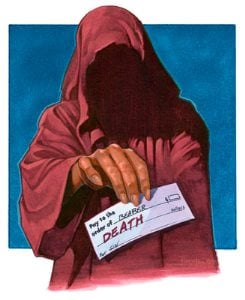Crime and Punishment
When a crime is not punished quickly, people feel it is safe to do wrong. Ecclesiastes 8:11 NLT
Several years ago I was studying with a family, while the wife’s father had a stroke and was in the hospital. I went to see him and arrived literally moments after he had passed away. The family asked me to join them in the family room as they met with doctors. A son said he probably would not have died if they would not have let him add that room onto the house. That extra work is what did him in. The daughter suggested he would still be alive if they had gotten him to his current hospital before taking him to the closer, smaller hospital. Everyone chimed in with their explanations on why the elderly gentleman had just passed away. As they talked, I listened quietly, while I thought to myself, he died because the wages of sin is death. Romans 6:23
Satan works with us over a lifetime, getting us to compromise here and there, and to disobey. Time goes by, and we think we are getting away with sin. Then at the end of the line, sin brings us to the grave, which is the reward of sin, and Satan says, “Thank you for playing my game.” While the Bible is chock- full of pleas of mercy from God, and forgiveness for transgressions, let’s not fool ourselves into thinking that sin does not have consequences, even when there is forgiveness and redemption. We do not want to use fear as a motivation for obedience, because we rightfully want to focus on God’s love and mercy. We don’t obey for rewards or to avoid punishment. We obey because we love Jesus. That being said, I will never forget hearing a preacher on the radio telling everyone, “God may be loving, merciful, and forgiving, but hell will still be hot!” I don’t know that I would use his exact approach, but he was right. In his lie in the garden, “You shall not surely die,” Satan insinuated there would be no dire consequences for sin. Today, as we stand over the grave of a loved one, we realize Satan is a liar. Even the repentant thief, who asked to be remembered in Christ’s kingdom, accepted his death as his just due. This is one sign that his repentance was genuine. He did not make any pleas for Jesus to deliver him from the consequences of his sin. The repentant thief was sorry for his sin, and not just the consequences. Even though forgiven and promised eternal life, he still had to pay the consequences. People point to David, and say “look at what David did, and God still forgave Him.” True. God did forgive David, and He will indeed forgive us. Still, there are two lessons we can take from David’s sin and repentance.
1. Even though David was forgiven, he still had to reap the consequences of his son dying, and also the influence of his sin on the rest of the family.
One son raped his sister, another killed his brother, and a third tried to take the throne from his father. Not exactly the legacy God wanted His nation’s first family to be passing along. Even though forgiven, David would have been much better off if he had never made those wrong choices. David’s repentance was sincere, in that He did not lament the personal consequences of his sin, but rather that He broke God’s heart.
“Against you, and you alone have I sinned.” Psalms 51:4 NLT
Many animal lovers ponder why a God of love would institute a sacrificial system where hundreds of innocent animals were slaughtered everyday. But it was not God’s plan for innocent animals to be slaughtered every day. It was God’s plan that when the transgressors crushed out the innocent life of the lamb, it would break their hearts, and they would not repeat the same sin over and over. David’s heart was broken when he contemplated the sacrifice that was made for his sin. This leads us to the second important observation concerning David and his sins.
2. The good news is we don’t see David going back and making the same mistakes over and over.
While Israel kept falling back into apostasy we don’t see David making the same mistake, possibly because, unlike Israel which, as a nation kept making promises and resolutions they could not keep, David clung to God’s promises. Instead of promising God He would be pure He asked God to purify him.
“Purify me from my sins, and I will be clean; wash me and I will be whiter than snow.” Psalms 51:8 NLT
Instead of trying to rehabilitate himself, David asks God to just recreate his heart.
“Create in me a clean heart, O God.” Psalms 51:10 NLT
The Bible teaches us there is a God who forgives and saves us. He loves us unconditionally. Still, let’s not lull ourselves into a false sense of security, like those Solomon talks about in Ecclesiastes 8:11, and think because sin is not quickly punished that there are no real consequences. From the sanctuary comes the message not only of forgiveness, but also of cleansing. When we submit ourselves wholly to Christ our Mediator, He will cleanse our characters. We can have confidence in His work both in us and for us.

